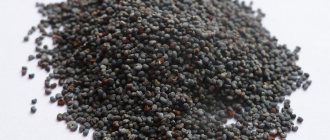Every woman, while expecting a child, strives to balance her diet in such a way as to convey as many useful substances as possible to the baby in the womb. In this case, preference is given not to medicines, but to natural products. Flax seeds help provide the expectant mother's body with the necessary substances during pregnancy.
From this article you will learn:
- Rich composition of flaxseed
- Flax seeds during pregnancy, their benefits
- Harm and contraindications of flax seeds during pregnancy
- How to take the product during pregnancy
What are the benefits of flax seeds for pregnant women?
- Phytoestrogens lingans, which reduce the risk of breast cancer, resist pathogenic bacteria and viruses, and also have an antioxidant effect on the body.
- Omega-3, omega-6 and omega-9 polyunsaturated fatty acids are critical for the correct development of the child, affect the health and youth of the skin, and prevent depression.
- , which is important for the proper functioning of the intestines and cleansing the body, prevents constipation, promotes healthy weight loss, due to stimulation of the intestines.
- Youth vitamins A and E, as well as B and F.
- Microelements: potassium, magnesium, manganese, selenium, calcium and iron.
- Polysaccharides, which, when dissolved in water, give a bactericidal and enveloping effect, which can be used for heartburn.
Flax seeds are useful not only during pregnancy, but also during the planning stage, as well as during breastfeeding.
Before going to bed, put some white yogurt in your vagina. The live bacteria in the yogurt will eat up the mold. Use this only until symptoms go away. Add a few teaspoons of sodium bicarbonate to your bath to reduce acidity. The herbs are greatly helped by chamomile ointment or a soothing bath in chamomile tea several times a day. You can also add a few drops of calendula tincture to your bath. If there is no improvement, consult a doctor.
If the discharge is white, yellow, or green, or if you experience odor and irritation, consult your physician. Tips for getting rid of the discharge are the same as the previous problem of “vaginitis”. However, this is not a separate disease. Diarrhea is divided into acute and chronic. The most common cause of acute diarrhea is infection. Another common cause of acute diarrhea is dietary mistakes. Sensitivity to these stimuli is very individual. Chronic diarrhea may be caused by cancer of the intestine, liver, pancreas, or gallbladder.
Benefits of flaxseed and oil for pregnant women
- Including flaxseed in your diet balances a woman’s hormonal levels, reducing the likelihood of miscarriage.
- Strengthening metabolic processes has a beneficial effect on the development of the fetus and the well-being of the expectant mother.
- The likelihood of developing severe diseases of the baby’s central nervous system is reduced.
- The enveloping effect of flaxseed decoction helps to get rid of constipation, a common companion for women in the second and third trimester of pregnancy.
- A decoction of flaxseed makes it safe for the unborn child to fight chronic stomach diseases - gastritis, inflammation of the gastrointestinal tract, cramps.
- Once in the circulatory system, the components of the seed cleanse the blood vessels of cholesterol plaques, reducing the likelihood of thrombosis.
- Drinking a decoction two hours before bedtime helps normalize sugar levels in pregnant women with diabetes.
- Omega fatty acids stimulate a woman’s immunity, reliably protecting her and the fetus from dangerous viral diseases, as well as infections of the kidneys and genitourinary system.
- Constant consumption of flaxseed oil or seeds helps stabilize the metabolic process, which allows you to maintain normal weight both during pregnancy and after childbirth.
- Flax products are also useful after the birth of a child, increasing the production of breast milk and reducing the possibility of postpartum depression.
How to Introduce Flax Seeds into Your Diet
There are many ways to consume flax seeds, but I recommend only three. The selection criteria are simplicity, effectiveness, safety.
- Grind the seeds in a coffee grinder, blender or mortar. It is not necessary to turn them into dust, the main thing is to disrupt the integrity, otherwise the seeds can pass through the digestive system without being digested. Add to everyday dishes - baked goods, salads, yogurt or kefir, muesli, porridge, etc.
- Germinate the seeds on a damp cloth. Below I will give recommendations for germination. In this form, the seeds contain three times more calcium, which is very important for the formation of the fetal skeletal system. Sprouts can be eaten separately or added to salads.
- It is better to pour boiling water over the seeds overnight in a thermos or simply wrap the cup in a towel and cover with a lid. This way you can activate polysaccharides, which will produce enveloping mucus, effective for heartburn and gastritis. Slime sounds creepy, but in fact it turns out something like jelly, the taste is quite good.
Studying the composition
Presence of lignans.
These are special hormones that increase the level of estrogen in a woman’s body. They can prevent the appearance of cancer cells. It is worth considering that these elements are contained only in flax seeds; they are no longer present in oil. It is better to drink a decoction obtained from this plant. Women who have hormonal imbalances and therefore have a risk of miscarriage should take flax seed during pregnancy with particular caution. In other cases, the plant strengthens the immune system and maintains skin tone. Omega-6 and Omega-3. These components are capable of causing regeneration and removing dead cells. Acids make the body strong and healthy.
Cellulose. Has proven itself well in medicine. Helps improve the digestive process, relieves bloating and constipation.
Vitamin complex (A, E, B).
Many other microelements that are necessary for human health (magnesium, selenium, potassium and others).
The composition is interesting and rich in useful elements. The question is: can flax seed be eaten during pregnancy? Experts have different opinions. Some doctors claim that this plant is useful not only for the expectant mother, but also for the fetus, namely its brain. In any case, before you start taking flax seeds, you need to consult your gynecologist.
Taking flax seed during pregnancy is 6 tablespoons of decoction per day. It's quite simple to do. You need to put 20 grams of seeds in a thermos, pour the contents with 200 ml of boiling water, and leave to brew for about 30 minutes. After this, the drink can be taken.
Another drink is flax jelly. It must be made from the flour of this plant. The seeds are ground well and then ground to a paste. Pour 2 teaspoons of the resulting seed into a glass of boiling water and place on low heat. The jelly is cooked for about 10 minutes, and it needs to be stirred constantly.
Taking flaxseeds is not a solution to the problem of deficiency of all nutrients, but it contains a huge amount of them.
- Cellulose. There is enough of it in flax seed to cleanse the intestines and normalize the functioning of the gastrointestinal tract (gastrointestinal tract). Effectively combats various types of problems in this area - for example, constipation, bloating and abdominal pain.
- Omega-6 and Omega-3 acids are responsible for the development of the central nervous system in the fetus and its restoration in the mother in case of certain disorders. By the way, the content of fatty acids in flaxseeds is three times higher than in fish oil.
- Folic acid is responsible for the full development of the child.
- A set of acids: oleic, stearic, palmitic and linoleic - help improve digestion and have an anti-inflammatory effect.
- Vitamins A, B, E.
Flaxseed oil is rich in vitamins A, E, B, F. It contains magnesium, zinc, iron and phosphorus. But its main value is Omega fatty acids (3, 6, 9). They are not produced by the body; we can only get them from food.
The oil contains arachidic, behenic, and stearic acids. It is also rich in phospholipids.
Flaxseed oil has proven itself well as a remedy for stretch marks. For this purpose, it must be used as soon as you know your situation.
Recommendations for use:
- The oil is applied to slightly damp, steamed skin after a shower;
- rub in circular massage movements, applying light pressure;
- problem areas – hips, abdomen, chest.
The oil does not need to be washed off the body. It is better to apply it 30 minutes before bedtime.
The product can be used to care for dry skin on the body, especially elbows or heels. One or two drops are applied to slightly damp skin after taking a bath.
Flaxseed oil can help restore brittle hair that is prone to loss. It nourishes the scalp and hair follicles. The hair stops breaking and the ends don’t split.
- Protein.
- lignans, which regulate the level of the hormone estrogen in the body;
- fiber, which helps regulate digestion;
- polyunsaturated fatty acids Omega 3, 6 and 9, which have a positive effect on the development of the child’s brain;
- biologically active and easily digestible protein containing 8 amino acids;
- and many more useful substances.
The composition is interesting and rich in useful elements. The question is: can flax seed be eaten during pregnancy? Experts have different opinions. Some doctors claim that this plant is useful not only for the expectant mother, but also for the fetus, namely its brain. In any case, before you start taking flax seeds, you need to consult your gynecologist.
Another drink is flax jelly. It must be made from the flour of this plant. The seeds are ground well and then ground to a paste. Pour 2 teaspoons of the resulting seed into a glass of boiling water and place on low heat. The jelly is cooked for about 10 minutes, and it needs to be stirred constantly.
Flax seeds are one of the most important sources of not only vitamins A and E, which are considered “vitamins of youth,” but also the following elements:
Omega 3 contained in flax seeds reduces cholesterol levels in the blood, helps fight hypertension and prevents the occurrence of certain types of cancer.
Before eating flax seeds, it is recommended to grind them in a coffee grinder or blender - this will increase the area of contact of the product with the intestines and facilitate the absorption of beneficial microelements. Most often, flax seeds are taken in one of three ways: in the form of a decoction, jelly or prepared oil.
On a note:
It is better to store ground seeds in an airtight container. Over time, they lose their beneficial properties, so it is not recommended to grind large portions at once.
To prepare a decoction of flax seeds: pour 1 tablespoon of flax seeds with a glass of boiling water and leave for about 30 minutes, then filter and drink warm.
Kissel is prepared from ground grains: brew 2 teaspoons in 200 ml of water, boil for 10 minutes, stirring constantly, and drink without straining.
Flaxseed oil also contains the entire range of beneficial properties of the product, with the exception of plant fiber, so if you have digestive problems, it is recommended to take the seeds.
How to germinate flax seeds
During pregnancy, diarrhea often causes changes in hormonal levels, especially increased levels of progesterone. Some medications can also cause diarrhea. Stool trimming sometimes occurs just before delivery because the body is automatically emptying itself and preparing for birth. Diarrhea impairs the absorption of water and certain substances. Diarrhea may just be a trivial condition that you get over quickly, but in some cases. When a large loss of water and minerals occurs, it can have a serious course.
Method 1: on a cloth napkin
- Do not overdo it with water, the napkin should be generously moistened, but nothing more.
- The napkin should be on top and bottom.
- After the first six hours, rinse the seeds twice a day with warm water directly in a napkin and drain the water completely.
- The napkin should not dry out.
Method 2: with planting in the ground
If vomiting or diarrhea lasts more than two days, or if you are unable to drink any fluids at all, contact your doctor immediately. Your doctor should also call if you have stomach pain, you have bowel movements more than six times a day, there is blood or more mucus in your stool, you have a fever, and you have low urine output. It is very dangerous to underestimate this situation. In case of minor difficulties, follow some basic rules. In the case of diarrhea and vomiting, there is a large loss of fluids and minerals, so it is necessary to supplement these nutrients.
- Do the same as in the first method, up to the roots of 2 mm.
- Then cover with a thin layer of soil and moisten.
- The earth should not dry out.
- Wait until the stems reach a height of 4-5 cm, this will take about five days.
- Cut and immediately use for food, preferably in green salads.
Drink 50 ml of liquid per 1 kg of your weight per day. It is more suitable for sweetened tea, unsaturated mineralized water, and broths. You can try a rehydration solution that is available at the pharmacy, or you can do it yourself. Although you may feel all the liquids leaving the stool or chewing them, if you take liquids in small doses and repeatedly, a certain amount is always absorbed, which is very important for the development of the disease. When treating acute diarrhea, it is good to reduce dietary intake for the first approximately 4 hours.
Strictly prohibited
You can often hear the question: “Can flax seeds be eaten during pregnancy?” There are contraindications and they should be taken into account. The plant is prohibited for the following diseases:
Gallstone disease. In this case, flax can provoke the passage of stones, the process is quite painful and unpleasant.
Uterine fibroids. This disease negatively affects the course of the entire pregnancy; the use of any herbs, decoctions, or medications is prescribed strictly under the supervision of a doctor.
Ulcer. The components can irritate and even damage the areas of the stomach affected by wounds.
Hormonal imbalance.
In all these cases, flax seeds are contraindicated.
How to Handle Flax Seeds
- If you grind flax seeds, you should not do it with a reserve, as oxidation will occur and some of the beneficial substances will be lost.
- If your method of consumption is decoction, limit yourself to brewing as described above. You should not literally boil the seeds, the reason is that the beneficial substances will be destroyed.
- If you want to preserve sprouts grown in a napkin, you can do this with honey. You can also add walnuts to this honey mixture.
- Flax seeds are the second highest content product after bran. Fiber works in the intestines by absorbing water. Therefore, pay attention to how much you drink, you should probably increase the amount of clean water you drink.
When are they contraindicated?
But for a number of conditions, including the supplement in the diet can have a negative effect. It is prohibited to use it when:
- Exacerbation of pancreatitis, cholecystitis, pathologies of the gallbladder, pancreas. If they occur in a compensated, chronic manner, consumption of seeds in small quantities is acceptable.
- Diarrhea of any etiology.
- Individual intolerance, allergic reaction, hypersensitivity.
- Intestinal obstruction, blockage.
- Kidney stones, bladder stones, so as not to cause blockage when moving large stones.
- Hepatitis or cirrhotic liver damage.
- Lack of iodine in the body, decrease/increase in thyroid-stimulating hormone, other pathologies of the thyroid gland, since flax interferes with the normal absorption of iodine.
Use caution if you suffer from seizures, mental illness, asthma, or poor blood clotting. When used as a laxative, ensure adequate fluid intake or blockage may occur.
Precautionary measures
- Consult your doctor who is managing your pregnancy
- Don't overdo it, one tablespoon of seeds per day is enough (in any form).
- Much has been written about how flax seeds can cause miscarriage, which is why they should not be taken in the early stages of pregnancy. Why are flax seeds such a concern? Because of phytohormones and, which are useful in the later stages, as they promote childbirth and for the same reason are not useful in the first trimester. But I’m sure you have to eat a bucketful of them to have a bad effect... also, I’ve never seen reviews on the forums that the seeds were harmful. But just in case, I do not recommend taking it at the beginning of pregnancy. Still, everyone’s sensitivity is different, it’s better to over... than under...!
- Check for any contraindications!
Then gradually add carbohydrate-type foods. Temporarily limit fatty foods, milk and milk products, flat foods, foods high in insoluble fiber, alcohol and coffee. Before you can treat diarrhea, you need to identify and correct the cause. Separate treatment then aims to prevent dehydration and salt loss and reduce the frequency of bowel movements to the amount you are usually used to. Important groups of drugs used during pregnancy are: Adsorption = insoluble substances with a large surface area to which various toxins are bound.
Tips for use
It is very important to know how to choose flax seeds, because the result of the entire treatment depends on it. Below are a few recipes:
- Infusion of flaxseeds. 1 tablespoon is poured into a glass of boiling water (250 ml) and left in a thermos overnight. In the morning, strain and drink.
- Grind a teaspoon of seeds to a powder and pour a glass of warm water. Leave for an hour, then drink. In some cases, kefir can be used instead of water.
- You can add flaxseed oil instead of vegetable oil to salads.
- Flax flour is added to baked goods.
- Decoction. 1 tbsp. pour 1 tbsp. boiling water and cook for 10 minutes over low heat. When the liquid has cooled, it is filtered and placed in the refrigerator. Drink 1/3 glass in the morning strictly on an empty stomach.
- Porridge is also prepared from flax seeds.
Taking flax in the form of oil has its own characteristics. Read a separate article on how to take flaxseed oil during pregnancy.
Pregnancy is a crucial period for women.
Everything matters: the organization of the working day, lifestyle and diet. Trying to saturate the body, which works for two people, with vitamins and minerals, women eat everything and do not understand how beneficial or harmful this or that product is.
This is the case with flax seeds - a natural source of amino acids, which the body perceives differently during pregnancy. And if it suits one expectant mother, this does not mean that the use of fruits should be recommended to all pregnant friends.
Tags: pregnant, can, drink, seed
About the author: admin4ik
« Previous entry
How to choose and where to buy flax seeds
The seeds should be smooth and shiny, and the packaging should be hermetically sealed. It is important that the packaging does not contain debris from damaged seeds.
Representatives that can be used during pregnancy without fear include charcoal or Smecta. The second group is oral rehydration solution. Members of this group include Imodium, which should not be taken during the first trimester of pregnancy. The fourth group is intestinal disinfection - it has an antibacterial and antimycotic effect. However, the use of these drugs is not recommended during pregnancy, and it is better to consult your doctor beforehand.
The last group of drugs for diarrhea is dominance = this is a soothing substance that improves the consistency of the intestinal contents. An example is the pectin found in apples. Foodborne infections and intoxications are sometimes also called foodborne illnesses, since their causative agents are most often found in the body through food or water. The creators are microorganisms. Unfortunately, some of these infections can have serious consequences for the fetus. In the case of pregnancy, the health of the fetus is compromised and premature birth or abortion is often threatened.
You can buy flax seeds in pharmacies, vegetarian stores, and eco-bio products stores. For example, here are good seeds for only 20 rubles, plus a large selection of other useful products for a healthy lifestyle.
Every year, society's interest in a healthy lifestyle and natural dietary supplements increases. Flax seeds, which have long been used as food by the inhabitants of Europe, but were forgotten for a while, have now found a second life. The benefits of this product are very high - it enriches the body with essential fatty acids, improves the functioning of the intestines and other internal organs. But flax seed also has contraindications.
Such infections include, for example, listeriosis or toxoplasmosis. The only way to reduce the risk of foodborne contamination and intoxication is to practice good hygiene and eliminate as many encounters with these agents as possible: simply select fresh produce from the store, inspect it thoroughly and wash it before use, and consume it sufficiently cooked. Wash your hands thoroughly before handling food. When handling raw meat, do not touch the oral mucosa.
Consume only pasteurized milk. Avoid eating mature cheeses during pregnancy. If you own a cat and feed it raw meat, the meat should be stored for several days in the freezer to prevent fumigation from life.
Briefly about the main thing
Flax seed during pregnancy, reviews of which are quite controversial among experts, are extremely popular. They help cope with many problems that await women expecting a child. Thanks to a decoction of the plant, you can remove swelling, improve bowel movements, and improve skin tone to prevent stretch marks.
Flax seeds have become quite popular recently. In the pharmacy you can find oil, tinctures, flour, and seeds of this plant. During pregnancy, a woman needs to be extremely attentive to her health. You should not resort to traditional medicine without obtaining the approval of an obstetrician-gynecologist.
Possible side effects
If the dosage is not observed or taken too often, flaxseed oil can cause the following disorders:
- Nausea, sometimes vomiting. They can be caused by an expired product, be careful.
- Diarrhea. Usually occurs when taking larger doses than prescribed.
- Allergy. Manifested by itching or redness.
If one or more symptoms occur, you should temporarily stop taking the oil.









